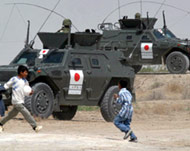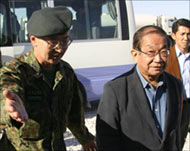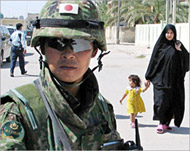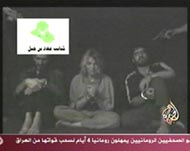Japan rejects captors’ demands in Iraq
The head of the Japan Defence Agency has said the activities of its troops in Iraq will not be affected by reports of a Japanese national’s capture in the country.

Yoshinori Ohno, the defence minister, said there had been no change in public safety in Samawa, the southern Iraqi city where about 600 Japanese troops are providing humanitarian help.
Security in Samawa has not worsened, Ohno said. “At this point, [the reported abduction] has no effect on the activities of the Self Defence Forces.”
Ohno said the safety of Japanese troops in Iraq had been confirmed.
Al-Qaida-linked group Ansar al-Sunna Army said it had detained a Japanese national, Akihiko Saito, during a fierce battle in western Iraq.
Injured
The group claimed on its website that it had captured Saito, 44, after ambushing a group of five foreign contractors. It said Saito was seriously injured in the fighting and that the others had died.
 |
|
Almost 600 Japanese troops are |
The site carried a photocopy of his passport, and the Japanese Foreign Ministry confirmed it was authentic, but said officials were still trying to verify information about the case.
The government set up a task force at the Foreign Ministry to deal with the reported capture.
“We are hurrying to confirm Mr Saito’s whereabouts, and if his reported seizure or serious injury turns out to be true, we must move urgently,” Foreign Minister Nobutaka Machimura said. “For now, our top priority is to gather accurate information.”
Security contractor
The ministry confirmed it had received information from British security firm Hart GMSSCO that Saito, a company consultant at its Baghdad office, was ambushed while travelling by car on Sunday with more than 10 other people in western Iraq, near the town of Hiyt, 150km northwest of Baghdad, and went missing.
Several of the others had reportedly died.
Japan’s Chief Cabinet Secretary Hiroyuki Hosoda said: “We are acting as though the information is true.” However, he said the government had not been contacted by anyone claiming responsibility.
 |
|
Ohno (R) says Samawa has seen |
The US military in Iraq had no information on the report of a captured Japanese citizen, spokesman Staff Sergeant Nick Minecci said.
Japan‘s Kyodo News agency said Saito was employed by a security firm from Cyprus and may have been working as a security officer at a US facility.
Kyodo also reported that Saito was a Japanese army paratrooper for two years before joining the French Foreign Legion in the early 1980s.
Captive’s brother apologises
Saito’s brother, Hironobu apologised profusely to the Japanese public at a news conference on Tuesday.
“I am so sorry that my brother Akihiko caused lots of concerns and troubles to the Japanese government, the people of the Foreign Ministry, and the Japanese people. I am sorry,” he said, sobbing.
|
“I am so sorry that my brother Akihiko caused lots of concerns and troubles to the Japanese government, the people of the Foreign Ministry, and the Japanese people. I am sorry” |
“More than anyone, I think my brother went into Iraq aware of the dangers. If the Japanese government decides it’s best to stay in Iraq, I will support [that] … I do not expect the Japanese government to waver for the sake of my brother.”
However, Hironobu Saito pleaded with captors to treat his brother’s reported injuries, and expressed shock at Saito’s capture.
“I thought that was impossible,” he said.
Hironobu said it had been nearly 10 years since he had seen Akihiko at home, and that his brother was quiet and did not tell his family much about his activities.
Previous captures
Shosei Koda, a 24-year-old Japanese backpacker visiting Baghdad, was captured last October and beheaded when Japan‘s government refused to bow to demands by his kidnappers that it withdraw its troops from Iraq.
A gruesome video of his murder posted on the internet said he was taken hostage by followers of al-Qaida-linked Abu Musab al-Zarqawi.
Five other Japanese people were captured in April 2004, but were later freed unharmed.
Humanitarian work
Those incidents fuelled opposition in Japan to the government’s dispatch of troops for a humanitarian mission in southern Iraq.
 |
|
Japanese soldiers are helping to |
About 600 soldiers have been stationed in the southern Iraqi city of Samawa, purifying water, rebuilding infrastructure and offering medical aid since early 2004.
The mission, combined with air and naval troops backing up the dispatch, is Japan‘s largest overseas military deployment since the second world war.
Many Japanese have criticised the deployment as being a violation of Japan‘s pacifist constitution, and for making Japan a target for attacks.
Abbas to visit Japan
Meanwhile, Palestinian President Mahmoud Abbas will visit Tokyo on Sunday for talks on the Middle East peace process, Japan‘s foreign minister said on Tuesday.
Abbas will hold discussions with Prime Minister Junichiro Koizumi and other senior Japanese officials during the three-day visit, the Foreign Ministry added in a statement.
Japan issued the invitation to Abbas in January as part of an effort to become more involved in the Middle East peace process.
Romanian stance
In other hostage news, Romanian President Traian Basescu said on Tuesday his country would not negotiate its foreign policy or discuss ransoms with the kidnappers of three Romanian journalists in Iraq.
 |
|
The Romanian hostages were |
“Romanian foreign policy responds to the demands of democratic countries and we are not going to make any compromises on that,” Basescu said.
He added that the liberation of the three journalists – seized on 28 March – remained a priority for his government.
While the hostages’ families and opposition parties urged Bucharest to heed the ultimatum, Romania’s foreign minister said last week that the country’s missions were based on UN Security Council resolutions and would not be changed because of the kidnapping.